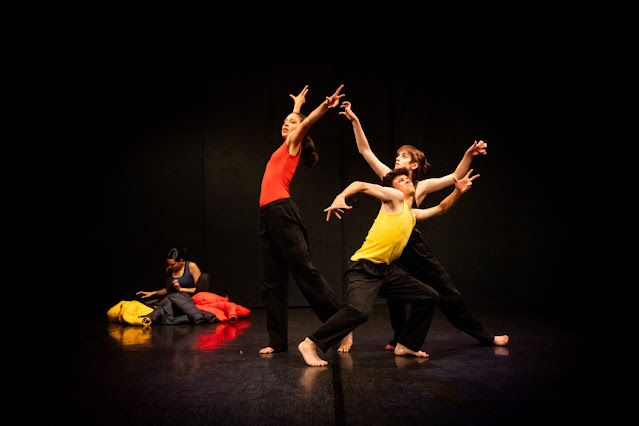 |
| Marcel Cole in "The Ukulele Man" |
Directed by
Dave Collins & Louiza Blomfield – Sound & Lighting Design by Lucy Van
Dooren
ACT Hub Theatre November 16-18. Reviewed by BILL STEPHENS.
It’s taken
Canberra a while to catch up with other Australian cities, but now it can
finally boast its own Cabaret Festival.
An initiative of ACT Hub and curated by
Dave Collins and Louiza Blomfield, the festival began modestly with five
different shows presented over three nights, with the laudable goal of
providing a platform for emerging Canberra artists.
The Festival
began promisingly with Tim Maher having the unenviable honour of being the
first cab off the rank with his show entitled “Café Boomer”.
 |
| Tim Cole in "Cafe Boomer". |
Accompanying
himself on an artfully disguised keyboard, and drawing on his experience as a
physiotherapist, Maher fashioned his show around relationships, beginning with
a sly parody of Billy Joel’s “Honesty” before launching into Leon Russell’s
“Masquerade” to support his proposition that “we are all wearing masks”.
Moving away
from the keyboard, Maher launched into an amusing discourse on relationships of
various kinds, emphasising particular aspects by weaving in songs from
well-known musicals, some of which were accompanied by pre-recorded
soundtracks. Among them, “To Break In A Glove” from the Michael Park/Ben Plat musical, “Dear Evan Hansen”; and two Stephen Sondheim
songs, “No More”, from “Into the Woods”, and a virtuosic rendition of the
challenging “Franklin Shepard Inc. ” from “Merrily We Roll Along”.
A monologue
from Yasmina Reza’s play “Art”, a quote from Michael Leunig and a medley
combining Eden Ahbez’s “Nature Boy”, John Farnham’s “You’re the Voice” and finally The Beatles,
“All You Need is Love”, rounded out an engaging, confidently performed and thoroughly entertaining presentation.
Marcel Cole
had already presented his cabaret “The Ukulele Man” at the Adelaide and Sydney
Fringe Festivals where it won him plaudits and prizes. Directed by Mirjana
Ristevski, “The Ukulele Man” tracked the story of British music hall star,
George Formby, who with his ukulele and repertoire of double entendre songs,
became Britain’s highest paid entertainer, and winning world-wide fame during
the 1930’s and 40’s mainly as a result of a series of popular B grade films, and
for his indefatigable efforts entertaining troops during World War 11.
With
considerable charm, and eschewing a microphone, Cole told Formby’s story
through a selection Formby’s most popular songs, including of course, “When I’m Cleaning Windows”, “With a Ukulele In My Hand”, and “Leaning on a
Lamp Post”, accompanying himself on both ukulele and banjolele.
A surprising
feature of Formby’s story was the influence exerted by his wife, Beryl, a
former entertainer who managed his career with an iron fist.
 |
| Katie Cole and Marcel Cole in "The Ukulele Man". |
In “The Ukulele Man”, Beryl was played by Cole’s
mother, Katie Cole, who not only portrayed Formby’s wife, but also Formby’s disapproving
mother and a BBC announcer; contributing
accompaniments on keyboards, violin and ukulele, while accomplishing lightning-fast costume changes.
All these
she achieved with considerable panache, as Cole also changed costumes,
stylishly portrayed emotional moments, and even included some eccentric
dancing. Well-chosen sound effects and
lighting all contributed to a hugely enjoyable, brilliantly executed cabaret
experience.
For their
cabaret “That’s What Friends Are For” Cabaret Festival curators, Dave Collins
and Louiza Blomfield, drew on their personal friendship and finely-honed ad
lib skills to present a relatively
unstructured, but delightfully entertaining selection of ballads and show tunes
utilising pre-recorded piano accompaniments.
 |
| Dave Collins and Louiza Blomfield in "That's What Friends Are For". |
Both are
superb vocalists, so particular highlights included a captivating arrangement
of “Over The Rainbow” from “The Wizard of Oz” blended with “Home” from “The Wiz” sung by Collins, who
also contributed an emotional rendering of Jason Robert Brown’s “It All Fades
Away”.
Blomfield
scored with her powerful rendition of “The Winner Takes It All” from “Mamma
Mia”, and their duet, “The Song That Goes Like This” from Spamalot, is probably
the funniest version of this song you’re ever likely to hear.
 |
| George Belibassakis in "Be Brave, Changeling". |
For his
cabaret, “Be Brave, Changeling”, George Belibassakis drew songs from a variety
of sources to illustrate an excoriating, deeply personal, account of his life
so far. An arresting a Capella rendition
of Johnny Cash’s “Hurt” followed his revelation of self harm, The Door’s,
“Hello, I love you”, explained his efforts to reach out. Thomas A Dorsey’s
“There Will be Peace In the Valley” and Nickelback’s “Gotta Be Somebody” brought
an often confronting, but ultimately optimistic cabaret to its conclusion.
The Festival
ended with an intriguingly entitled show “Cruise Ships and Crematoriums”
presented by Lawson Reid.
Revealing an
engaging personality, and an enviable talent for stand-up, Reid regaled his
audience with a stream-of-consciousness account of his life working on cruise
ships, living in government subsidised
hotels after being made homeless by floods, then finally discovering his
niche as a “Pet Aftercare Specialist and Corpse Removalist”.
Accompanying
himself on guitar, Reid augmented his own original songs with others including Carrie
Underwood’s “Drinking Alone”, The Eagles “Hotel California” and Willy Nelson’s
“On the Road Again” while keeping his audience agog with his revelations so
bizarre that they had to be true; thus providing a fascinating climax to
Canberra’s first highly successful Cabaret Festival.
An edited version of this review first published in the digital edition of CITY NEWS on 20.11/23













.jpg)




















